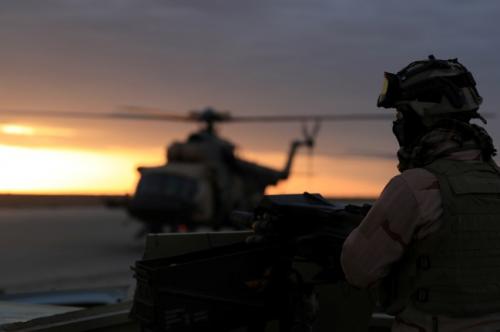



Iran fired a series of missiles at US military bases in Iraq on Wednesday to avenge the killing of the head of the Islamic Revolutionary Guard Corps' elite Quds Force by the United States, worsening the already tense situation in the Persian Gulf region.
The strike began early on Wednesday when the Revolutionary Guard targeted the US air base at Ain al-Assad in Al-Anbar province in western Iraq with dozens of missiles. US planes on the ground were hit in the strike, according to Iran's Islamic Republic News Agency.
The other attack took place on US forces in Irbil, northern Iraq.
A source from the Revolutionary Guard said at least 140 targets of the US and its allies had been identified in the region and would be attacked "if the Americans commit any kind of mistake again".
Iranian Foreign Minister Mohammad Javad Zarif described the missile attack as a "proportionate measure" made "in self-defense" in response to Friday's killing of Qasem Soleimani.
In remarks made on social media, Iran's top diplomat said that the nation "took and concluded proportionate measures in self-defense" under article 51 of the UN Charter, targeting the base from which the "cowardly armed attack against our citizens and senior officials was launched".
Soleimani was killed in a US drone strike outside Baghdad airport on Friday.
An Iranian state television presenter later claimed, without offering evidence, that Wednesday's strikes had killed "at least 80 terrorist US soldiers" and damaged helicopters, drones and other equipment.
'Slap in the face'
Iran's Supreme Leader Ayatollah Ali Khamenei referred to the attack as a "slap in the face" of the Americans, adding that military retaliation is not sufficient.
He also said that US forces should withdraw from the region. "The corrupt presence of the US in the region should come to end."
The Revolutionary Guard Corps also said in a statement that the US should withdraw its army.
"We advise the American people to recall American troops in the region in order to avoid further losses and not to allow the lives of its soldiers to be further threatened by the ever-increasing hatred that the American regime, with its hatred of any people, is stirring up against it."
Meanwhile, the Iraqi military said that no casualties among its forces had been reported as a result of the Iranian missile attacks.
US President Donald Trump responded shortly after the strike on social media, saying that "all is well!" He did not reveal any more information on losses but said "so far, so good" regarding casualties.
The changing situation in the Gulf region has drawn concerns over whether there will be another war, but Zarif emphasized that the country has no willingness to start a war.
Zarif stressed that Teheran does not "seek escalation or war", but Iran will defend itself against any aggression.
Restraint urged
Chinese Foreign Ministry spokesman Geng Shuang on Wednesday called on the related parties to exercise restraint and resolve conflicts through dialogue.
Geng said at a news conference in Beijing that China has always advocated solutions to conflicts and differences based on respect and through peaceful negotiations, as well as efforts to jointly maintain regional peace and stability in the Middle East.
"We have stated many times that the further deterioration of the situation in the Middle East is not in the interest of any side, and ensuring peace and stability is of great importance to the world," he said.
Li Weijian, a researcher at the Shanghai Institutes for International Studies, said all indications are that both Iran and the US are reluctant to worsen the already tense situation and there will probably be no large-scale war in the region.
The fact that Iran called an end to its military action on Wednesday shortly after the strike indicated that it does not want to provoke a war, and that the strike was only an act of revenge, Li said. "Besides, Iran is not sure whether it can beat the US."
On the other hand, Li suggested that the US also does not want to embark on a path of greater retaliation against Iran, especially a war requiring large commitments of troops and financial resources.
However, the expert said it is hard to predict the direction of the situation, but "at least both sides have shown their attitude is not to have a war".
Ursula von der Leyen, president of the European Commission, reiterated on Wednesday the need to reduce tension in the region.
"The use of weapons must stop now to give space for dialogue," she said. "We are called upon to do everything possible to rekindle talks. There cannot be enough of that."
Meanwhile, a top commander in Iraq's Hashd Shaabi paramilitary network said on Wednesday it was time for an "Iraqi response" to the US drone strike, which also killed Abu Mahdi al-Muhandis, the network's deputy chief.
"That response will be no less than the size of the Iranian response. That is a promise," Qais al-Khazali, a hardline Hashed commander, threatened on social media.
Reuters, AFP and Xinhua contributed to this story.
If you have any problems with this article, please contact us at app@chinadaily.com.cn and we'll immediately get back to you.